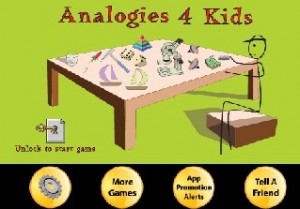Bartleby’s Book of Buttons may be the best educational iPad book available. I don’t say this lightly. There are a lot of books on the iPad that my kids absolutely love. Certainly the Toy Story iPad games would come to my kids’ minds. But that is because the kids have an affection for Toy Story. […]
Analogies for Kids is an educational iPad app that has a premise I love. It is a quiz that lets kids practice both verbal and geometrical analogies. It is extremely low tech but the questions are just great and I think they really help cultivate young minds. My dream is that one day there are […]
Nearly 300 Kindergarten students in Alburn, Maine are getting Apple iPad 2s this fall. School superintendent Tom Morrill calls the iPad what I have called it: a revolution in education. This is just a plain good thing for these kids. But the Washington Post always feels compelled tomanufacture a debate in an effort to be […]



 Miller & Zois Kids Blog
Miller & Zois Kids Blog

